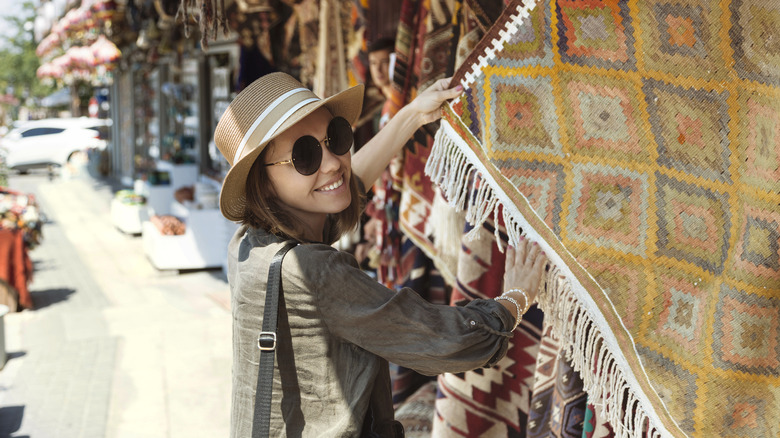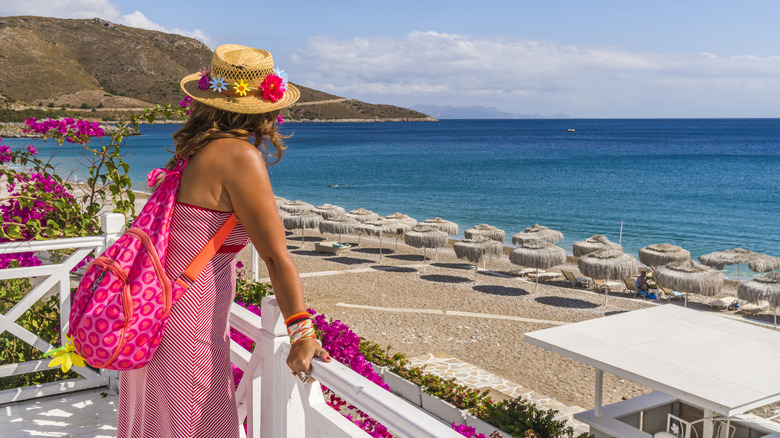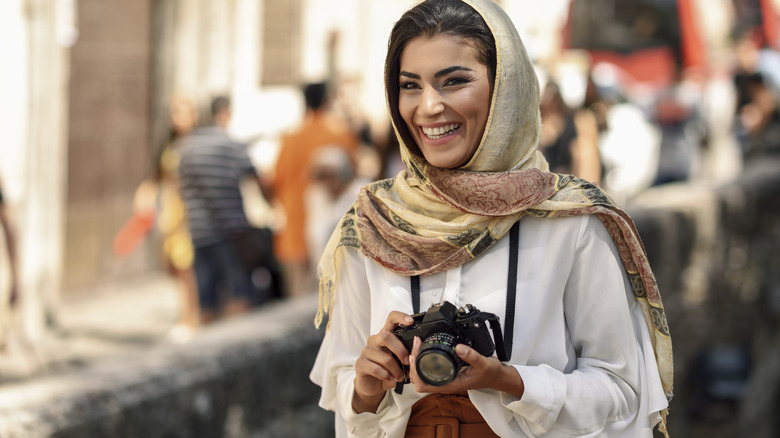Why Tourists Need To Be Cautious Of The Clothing They Pack On A Trip To Turkey
While it's true that Turkey — a picturesque country nestled between European modernity and Asian tradition — embraces plenty of Western customs and styles, the reality is that understanding local dress codes can make the difference between a smooth, enjoyable trip and inadvertently offending the locals. After all, showing respect for local traditions goes a long way no matter where you're headed.
That said, if you're looking to be a considerate tourist while visiting Turkey, one of the most important things you'll want to keep in mind is how you dress while exploring the country's many regions. From storybook destinations brimming with otherworldly cave dwellings to hitting up busy city markets in search of authentic souvenirs, Turkey's diverse and varied landmarks, activities, and attractions mean that one type of outfit won't suit every situation. In addition to that, Turkey also blends Western influence with its more conservative Muslim culture, meaning some places require you to dress more modestly than the more Westernized tourist spots.
Understanding these subtle differences can ultimately help you pack appropriately and make the most of your visit. This means planning for different cultural settings, preparing for various activities, and adapting to regional expectations — as well as keeping comfort and practicality in mind, no matter where your Turkish adventures take you.
Exploring Turkey's cities and coastal resorts
Put simply, the key to packing for Turkey lies in versatility. In metropolitan areas like Istanbul, for example, you'll likely find locals and tourists alike wearing casual Western-style clothing with varying degrees of modesty. This includes everyday clothing items like knee-length skirts or denim shorts, sleeved shirts or tank tops, sundresses or maxi dresses, and everything in between.
Despite this level of leniency toward casual wear, it's also important that you try not to call too much attention to yourself. Staying away from items like crop tops and super-short shorts — which can be considered inappropriate and even disrespectful, in certain scenarios — is always for the best. Additionally, being mindful of low-cut tops and see-through clothing can also help you avoid any scrutiny. In general, dress modestly if you're visiting more rural areas.
On the other hand, coastal resort towns like Antalya and Bodrum are usually quite welcoming and accepting of the same standard beach attire you'll likely see everywhere else. Bathing suits — both bikinis and a one-piece are perfectly acceptable — as well as casual beachwear like sundresses, strappy shirts and blouses, shorts, and sandals are all completely fine. That said, make sure you keep swimwear to the beach and put on walking clothes when you're around town.
What to wear when visiting religious sites
Visiting religious sites in Turkey requires more careful attention to the dress code, particularly when visiting mosques or more rural destinations. Specifically, in terms of modesty requirements, you'll need to cover your shoulders, knees, and hair before entering. In most cases, carrying a lightweight scarf in your day bag can serve multiple purposes — from covering your head to protecting your shoulders from the sun. If you don't bring one, certain sites like the Blue Mosque can provide a head scarf for you to wear during your visit, and then return once you're done.
Along with that, many tourists also prefer to bring a thin, long-sleeved shirt that they can easily slip over sleeveless tops while visiting other landmarks. In cases like these, cotton and linen items are a great choice — helping you both stay cool and maintain an appropriate level of modesty. Plus, considering the fact that the best time of year to visit Turkey is right around summertime when the weather's bound to be a little warm, you're more than likely going to want to focus on lightweight, breathable fabrics during your trip anyway.
Oh, and as a final word of warning, make sure you bring some socks in your bag too. You'll need to remove your shoes when visiting mosques, and having a pair of socks handy will save you the trouble of having to walk around barefoot.


